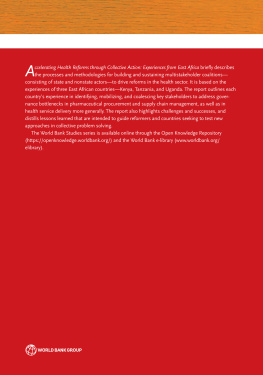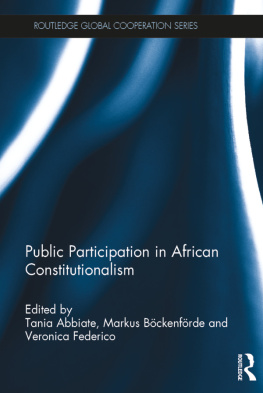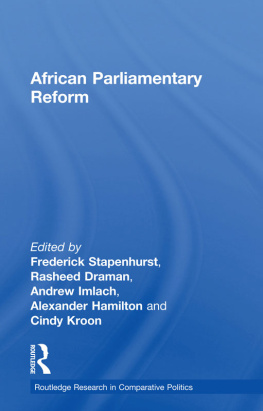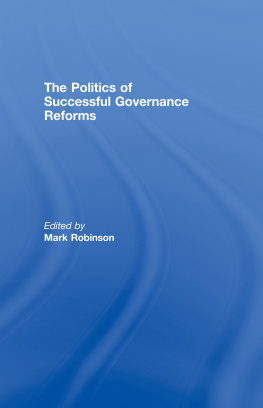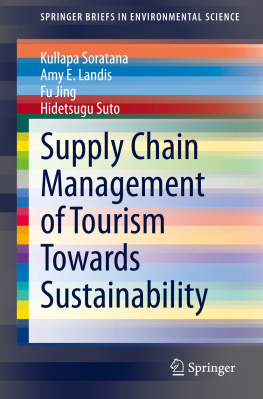A WORLD BANK STUDY
Accelerating Health Reforms through Collective Action
Experiences from East Africa
Yvonne Nkrumah and Julia Mensah, Editors

2014 International Bank for Reconstruction and Development / The World Bank
1818 H Street NW, Washington DC 20433
Telephone: 202-473-1000; Internet: www.worldbank.org
Some rights reserved
1 2 3 4 17 16 15 14
World Bank Studies are published to communicate the results of the Banks work to the development community with the least possible delay. The manuscript of this paper therefore has not been prepared in accordance with the procedures appropriate to formally edited texts.
This work is a product of the staff of The World Bank with external contributions. The findings, interpretations, and conclusions expressed in this work do not necessarily reflect the views of The World Bank, its Board of Executive Directors, or the governments they represent. The World Bank does not guarantee the accuracy of the data included in this work. The boundaries, colors, denominations, and other information shown on any map in this work do not imply any judgment on the part of The World Bank concerning the legal status of any territory or the endorsement or acceptance of such boundaries.
Nothing herein shall constitute or be considered to be a limitation upon or waiver of the privileges and immunities of The World Bank, all of which are specifically reserved.
Rights and Permissions

This work is available under the Creative Commons Attribution 3.0 IGO license (CC BY 3.0 IGO), http://creativecommons.org/licenses/by/3.0/igo. Under the Creative Commons Attribution license, you are free to copy, distribute, transmit and adapt this work, including for commercial purposes, under the following conditions:
AttributionPlease cite the work as follows: Nkrumah, Yvonne and Mensah, Julia, eds. 2014. Accelerating Health Reforms through Collective Action: Experiences from East Africa. World Bank Studies. Washington, DC: World Bank. doi:10.1596/978-1-4648-0287-4. License: Creative Commons Attribution CC BY 3.0 IGO
TranslationsIf you create a translation of this work, please add the following disclaimer along with the attribution: This translation was not created by The World Bank and should not be considered an official World Bank translation. The World Bank shall not be liable for any content or error in this translation.
AdaptationsIf you create an adaptation of this work, please add the following disclaimer along with the attribution: This is an adaptation of an original work by The World Bank. Responsibility for the views and opinions expressed in the adaptation rests solely with the author or authors of the adaptation and are not endorsed by The World Bank.
Third-party contentThe World Bank does not necessarily own each component of the content contained within the work. The World Bank therefore does not warrant that the use of any third-party-owned individual component or part contained in the work will not infringe on the rights of those third parties. The risk of claims resulting from such infringement rests solely with you. If you wish to re-use a component of the work, it is your responsibility to determine whether permission is needed for that re-use and to obtain permission from the copyright owner. Examples of components can includebut are not limited totables, figures or images.
All queries on rights and licenses should be addressed to the Publishing and Knowledge Division, The World Bank, 1818 H Street NW, Washington, DC 20433, USA; fax: 202-522-2625; e-mail: .
ISBN (paper): 978-1-4648-0287-4
ISBN (electronic): 978-1-4648-0288-1
DOI: 10.1596/978-1-4648-0287-4
Library of Congress Cataloging-in-Publication Data has been requested.
Contents
Acknowledgments |
About the Contributors |
Abbreviations |
Chapter 1 | Background |
Yvonne Nkrumah and Julia Mensah |
Introduction |
Governance in PSM: A Crucial Role |
The Case for Collective Action |
Improving PSM Governance: The Initiative |
Why This Book? |
Outline of the Book |
Notes |
Chapter 2 | Putting Down Roots |
Jacqueline Idusso, Joseph Mhando, and Eva Ombaka |
Introduction |
Tanzania Country Context |
Key Health Issues and the Reform Agenda |
Key Challenges in the Pharmaceutical Sector |
Rationale for Setting up a Multistakeholder Coalition |
Multistakeholder Groups and Other Forms of Collaboration in Tanzania before 2010 |
Collaborations in the Health and Pharmaceutical Sectors |
Learning from Other Countries |
The Need for a Different Multistakeholder Approach in Tanzania |
From Dispersed Groups to Coalition |
Mapping the Stakeholders |
Identifying a Convener |
Clarifying Responsibilities |
Making the Coalition Work |
Lessons Learned |
Notes |
Chapter 3 | Growing a Strong Trunk |
Debra Gichio, Teresa Omondi, and Abel Nyakiongora |
Introduction |
Kenya Country Context |
Rationale for Setting Up a Multistakeholder Coalition |
Moving the Reform Agenda Forward |
Nourishing and Sustaining the Coalition |
Mobilizing Resources |
Leadership |
Creating a Sense of Ownership |
Providing the Right Incentives |
Celebration and Acknowledgment of Shared Achievements |
Challenges and Lessons Learned |
Notes |
Chapter 4 | Branching Out and Bearing Fruits |
Emmanuel Higenyi, Jacqueline Idusso, and Robinah Kaitiritimba |
Introduction |
The Ugandan Context |
Health Sector Hurdles and Opportunities |
The Pharmaceutical Subsector |
An Opportunity for Collaboration: The Existing Multistakeholder Landscape |
Working Together: Setting Priorities for Initial Steps |
Generating Evidence to Inform Policy |
Lessons Learned |
Notes |
Chapter 5 | Epilogue |
Kenya: The Forum for Transparency and Accountability in Pharmaceutical Procurement |
Tanzania: The Tanzania Multistakeholder Group on Pharmaceutical Procurement |
Next page
